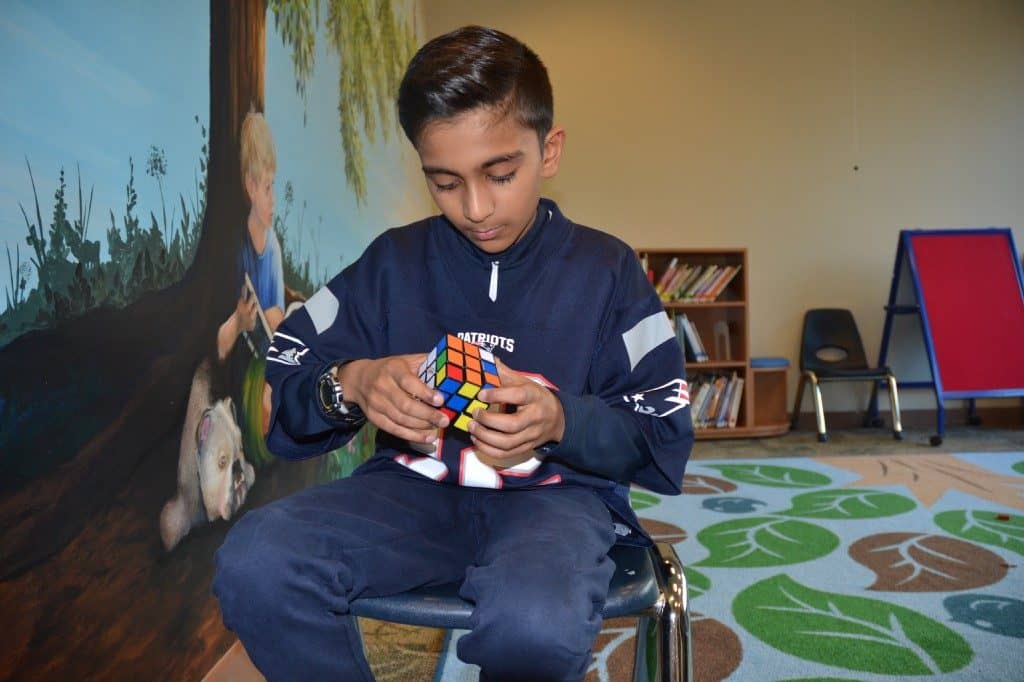
Zayb Khan is not only solving Rubik’s Cubes, but he’s sparked something of a local trend with his children’s classes at the library where he’s teaching others how to master the cube.

Zayb Khan’s agile hands move quickly as he turns the rows of his Rubik’s Cube. These days, Khan can solve a six-row cube in around a minute flat. He’s unfazed by conversation and is able to make idle chatter as he makes quick work of the puzzle.
Khan is not only solving cubes, but he’s sparked something of a local trend with his children’s classes at the library where he’s teaching others how to master the cube. Khan is only 10-years-old.
Khan learned how to solve the puzzle after his teacher issued him a challenge. He was fooling around with the cube one day in class, and his teacher asked him if he’d like to solve the cube in front of the class. He agreed, but there was one problem: He didn’t know how to solve a Rubik’s Cube.
So, Khan went home and memorized something like 60 algorithms for solving a Rubik’s Cube. Two days later, he was showing the class how to solve a Rubik’s Cube.
Khan’s mother, Huma Khan, said she was astounded when she walked into Moorestown’s Upper Elementary School one day and saw other students with Rubik’s Cubes in their hands. Khan’s peers were asking him to show them how to solve the puzzle.
So the Khans approached the library and asked to hold a children’s program where he could teach others how to solve the cube, and the library happily agreed. So, for the past few months, Khan has taken fellow young students under his wing and let them in on the secrets to conquering the puzzle.
He starts by explaining to them that you have to create a white cross, and then walks them through the subsequent steps. He’ll sit one-on-one with attendees as they grapple with their cubes and help show them the tips and trips until they’re solving puzzles on their own.
The cube is just the latest in a series of self-imposed challenges for the fifth-grader. He has 38 digits of pi memorized and is working on adding more to his repertoire. While he enjoys solving puzzles and games, he also creates his own pretty regularly.
Whether it’s making his own basketball game out of cardboard or coding a game that riffs off of Minecraft, Khan’s brain is constantly at work creating and solving puzzles.
“Building lets me let out my creativity,” Khan said.
Khan regularly asks his parents to issue him a challenge, and he’ll go out and create it. His father, Asim Khan, once asked him to create a flying unit. So, Khan built a hovercraft with twin turbo engines. He talks about his inventions with a palpable enthusiasm that bubbles up as he discusses his inventor’s journal where he regularly jots down the ideas he’s working on.
These days, Khan and his father have their eyes set on their next challenge. Khan is currently researching if the stock market can be predicted, and he plans on presenting his findings at the UES science fair this spring. Asim said whether it’s a Rubik’s Cube or stocks, nearly everything has a theory or algorithm behind it, and Khan is eager to learn them.
Khan’s also given some consideration as to whether he wants to enter Rubik’s Cube speed solving competitions, but he’s not quite sure yet. In the meantime, he’s hard at work issuing himself new challenges.
“My science teacher always says, ‘Don’t be afraid to fail. Failing is first attempt in learning,’” Khan said with an infectious smile and a glint in his eyes.
Check www.moorestownlibrary.org to see when Khan’s next program will take place.









